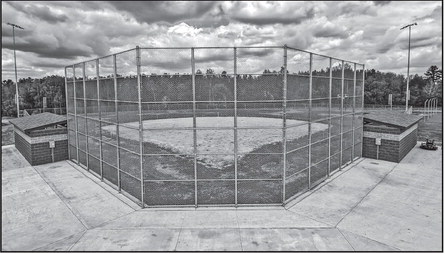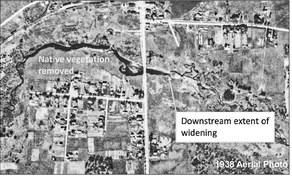Marathon hustles to complete ballpark


By Kevin O’Brien
Marathon City is up against a June 30 deadline to complete the first phase of its new ballpark facility, which became more complicated after it was discovered that the fields may not have been built to the standards set by the Wisconsin Intercollegiate Athletic Association (WIAA). Village administrator Steve Cherek told the village board at its May 7 meeting that he recently met with representatives of the Wisconsin DNR, which is providing a $450,000 grant to cover portions of the ballpark. They told him that construction needs to be completed by June 30 in order for the village to collect the grant money, so he has made it his top priority to get it done on time.
While staking out the bases, Cherek said he realized that the infields were two feet too narrow, and the batter’s boxes also needed wider radiuses to meet WIAA regulations.
Cherek told the board last week that the cost for redoing all three fields would be $50,500, but after speaking with an engineer involved in the project, he said Tuesday that the extra work won’t be needed after all. He said the initial measurements were skewed by misplaced dirt on the field.
Still, the prospect of another change order raised some questions from board members.
Trustee Jeff Lawrence said the village
See BALLPARK/ page 2
Steve Cherek Ballpark
Continued from page 1
should not be expected to pay for those types of change orders, as the village was not in charge of setting the dimensions.
“The company we hired to design this should know what they’re doing,” he said. “This should fall on them.”
Cherek said he had contacted the village’s attorney to see who should be financially responsible for fixing any mistakes.
Marathon High School’s varsity softball team continues to play its games at Veterans Park, but it plans to switch to the new ballpark once a rental fee is established. A sewer line serving the park’s bathroom recently collapsed and had to be replaced at an estimated cost of around $20,000, but Cherek said the school and American Legion offered to help cover the cost.
There’s also lingering questions about drainage issues on the new fields, as water occasionally pools near the dugouts. Cherek said planting grass on the fields and letting the roots take hold has mitigated the problem, but the village may need to install drain tile in the future if it continues to be an issue.
Trustee Mark Ahrens said this is another issue that should have been addressed by the designer before the fields were established.
“There isn’t a baseball field around that doesn’t have water issues,” he said. “That should be automatic to put drain tile down.”
Cherek said it was actually the village’s decision not to install drain tile due to the cost, but it can always be added later.
Village employees, including Cherek, are doing as much of the work as they can themselves – such as putting up scoreboards, installing landscaping rock around the flagpole and seeding a berm that needed to be built as part of a purchase agreement with a landowner. Cherek said this extra work is creating a backlog in other areas, such as cutting grass and submitting grant reimbursements.
Cherek said he’s working closely with the various contractors involved in the project to make sure all the work gets done by the end of next month, including blacktopping and hoop installations for a basketball court at the ballpark.
“Overall, the project itself is moving along,” he said. “I do want to say, it’s looking nice.”
Trustee Keith Paul suggested that the village host a grand opening event at the ballpark sometime this summer, perhaps over the Labor Day/Fun Days weekend. He also suggested offering tours of the new wastewater treatment plant so the public can see what’s been done.
Paul said showing off these facilities will “drive some good, positive energy into these projects that have had some negative feelings toward them.”
Cherek agreed, noting that once the ballpark is done, it should bring in teams and fans from outside the village and create more economic activity locally.
“It’s all positive,” he said. “It should bring in business and help our growth.”
Ranking village projects
Trustees went over a list of capital improvement projects for the next two years, which have been ranked in order of importance by both board members and village staff. Many of the projects with the highest ratings have already begun but still need to be finished, including the ballpark and the new sidewalk along Fourth Street.
Another top-ranked project, replacement of the flooring at the U.S Post Office, was approved at last week’s meeting, with the board agreeing to pay Crane Engineering $15,910 to resurface what is now bare concrete at the office. The village’s lease with the United States Postal Service, which was renewed last year, requires the village to restore the vinyl flooring.
Three smaller street projects are also planned for this year using $60,000 allocated for street maintenance in the 2025 budget. These include replacement of a culvert on Community Circle where a sinkhole formed last year; replacing a storm drain inlet and installing a wedge patch on Oak Street, between Fourth and Fifth; and improving the gravel roadway on Sonnetag Road, from Pine Street to the village’s west boundary line.
Looking ahead, the village is planning for a couple of major utility projects, including the establishment of a new well for an estimated $3 million and the relining of up to 11,500 feet of clay sewer pipe. Depending on the funding sources available, both projects are likely to result in significant rate increases for utility customers, according to the CIP plan.
When it comes to the well project, the village is about five years away from a deadline to replace Well 1 before it is shut down by the DNR. The process to establish a new well takes up to three years, according to the CIP, so the village is starting to plan for it now and is looking at applying for a Safe Drinking Water Loan that would be paid back over 20 years.
Cherek told trustees that the village has also applied for a federal grant to help pay for the project and is exploring the possibility of rehabilitating Well 1 to extend its lifespan.
For the sewer line project, the village is considering a lower-cost option for relining the clay pipes that involves cured-in-place piping (CIPP), which could extend the life of the sewer lines by another 50 years, according to the plan. This option, if implemented soon, would alleviate the need to dig up and replace the aging pipes at a cost of $660 per foot, compared to $40 per foot for CIPP. The total estimated cost for CIPP is just over $670,000.
“If this project is not completed soon, sections of the sewer main identified by the public works director will begin to fail, leaving excavation and replacement as the only option,” the plan states.
Cherek said members of the Marathon Utility Commission would like to move forward with the CIPP option, but they want to be selective about it and start with only the worst sections of pipe rather than doing all 11,500 feet at once.
Other major expenses on the horizon include replacing the village’s 1996 International plow and dump truck, for an estimated $265,000, and the 1999 street sweeper, for an estimated $368,000. Trustees said they want to know more information about these requests, such as how many work hours have been logged on the machines and what are the annual repair costs.
Cherek said he’s been working with the village’s financial advisors at Ehlers & Associates and plans on inviting them to the board’s next meeting on June 4, when trustees will be asked to officially approve the 2025-2027 plan.
“I want them to come in here and help answer some of these questions we have so the board feels comfortable approving the plan,” he said. “I’ve spent a lot of hours on analyzing the budgets and trying to make sure they fit, but I want everyone to be confident that the plan we’re doing is what we all agree with.”
Other business
■ Cherek told the board that Marathon County plans to do a follow- up inspection on the village’s mobile park this Friday, May 16, to verify that certain maintenance issues have been addressed before the board considers renewing its license for another year.
■ The board approved an easement agreement with John and Candy Hack, aka John Candy, LLC, that will allow the village to run water and sewer lines through the couple’s property north of STH 29 in the new industrial park. The cost to the village is $2,500.
■ The board approved alcohol operator’s licenses for William Bolin at The R-Store and Kira Giese at the True North gas station.
ALMOST READY - This photo, taken from the second floor of the concession stand building at Marathon City’s new ballpark, shows one of three newly completed ball diamonds. SUBMITTED PHOTO




